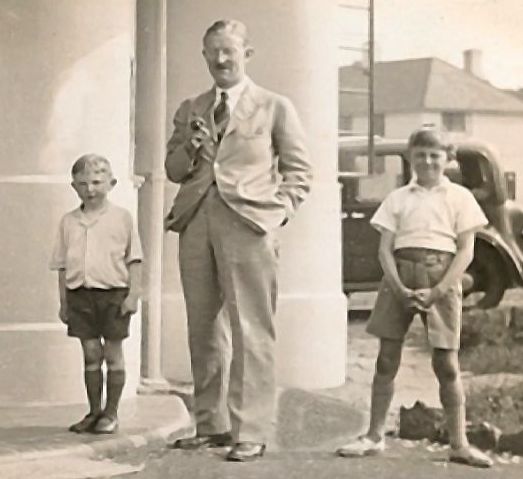By David J. Pearce, alumnus

After my father left Manchester Grammar School in 1911, he was articled to an insurance company to be trained in the insurance business. When World War One started he, like many men, volunteered to join the Infantry and was accepted, subject to a medical examination. However, he failed the Medical because of poor eyesight and was not accepted.
He was so disappointed that he asked if there was any other unit of the army which he could join. It was suggested that he tried the Royal Army Medical Corps (RAMC), which he did and was accepted as grade C, which meant he could only serve in this country. He therefore became a private in the RAMC and was a stretcher bearer, meeting the wounded and taking them to the military hospitals. Soon after the War Office was concerned that, although the wounds of seriously injured soldiers appeared to be healing very nicely, they would then become septic and create worse problems than the original injury. They therefore asked the professor of pathology, at the University of Manchester, if he could increase the amount of research to discover the reason, and find a solution.
The professor replied was that he could, but only if he had enough lab assistants. But by then most of his lab assistants had been conscripted into the Navy, Army or Air Force. The War Office said that they could post some RAMC privates to the University if the professor could train them to be lab assistants. My father, (Private Raymond Maplesden Pearce) was posted to The University of Manchester. He spent the rest of the War as a lab assistant at the Manchester Medical School. When the war was over and he was about to be demobilised, the professor asked him what he was going to do. Since my father was not interested in returning to the insurance business, the professor of physiology said, “Why don’t you apply to the University Medical Faculty to take a medical degree and if you do I can give you a very good recommendation.”
That is how my father became a doctor. After he qualified in 1925, he became an assistant to a country GP in Halifax and in 1930 he returned to Manchester and set up his own GP practice at No. 2 Denmark Road. In 1934 he took on a partner who took over the surgery at Denmark Road and he moved to Altrincham Road, Wythenshawe. Most of his patients were from the slums of Hulme and in the 1930’s and after World War Two, many of his patients were being re-housed in Wythenshawe. In the late 1940’s, his partner from Denmark Road moved into the first GP Medical Centre to be opened in Manchester. Eventually the house in Denmark Road was demolished and replaced by student accommodation.
Postscript from the University Archive: Dr Raymond Maplesden Pearce TD MB ChB (Manch) 1925, was an assistant in the Department of Bacteriology & Preventive Medicine and worked under Professor of Pathology, Henry Dean and Professor of Bacteriology, Topley. Pearce published papers in the British Medical Journal around 1929 on the use of the drug ‘SUP 36’ to treat infections. He also wrote two novels: Doctor Allen GP in 1930 & Deplorable Doctors 1965.